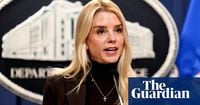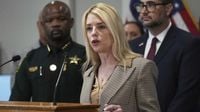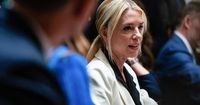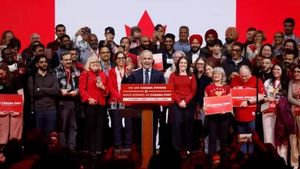In a significant policy shift, Attorney General Pam Bondi announced on April 25, 2025, that the U.S. Department of Justice will resume the practice of subpoenaing journalists' phone records and compelling their testimony in leak investigations. This move marks a stark departure from the protections established during the Biden administration, which sought to limit such actions against members of the press.
Bondi's internal memo, which was obtained by various media outlets including CNN and Axios, outlines her rationale for this reversal. She stated that the previous policies, put in place by former Attorney General Merrick Garland, had been “abused” and allowed for politically charged leaks to persist without accountability. "This conduct is illegal and wrong, and it must stop," Bondi emphasized in her memo.
The announcement comes amidst a backdrop of increasing tensions between the White House and news organizations, particularly those that have been critical of President Trump. Bondi’s memo reflects a renewed commitment to investigate and prosecute officials who leak sensitive information to the media. She noted, "Safeguarding classified, privileged, and other sensitive information is essential to effective government and law enforcement," indicating a broader scope of information that could be targeted under the new policy.
Under the revised guidelines, Bondi stated that federal prosecutors will now have the authority to pursue communications from media outlets as part of leak investigations. However, she also assured that the Department of Justice will implement procedural protections to limit the use of compulsory legal processes aimed at journalists. These protections include requiring advanced notice to subpoenaed news outlets and ensuring that subpoenas are "narrowly drawn."
Bondi's memo also outlined the conditions under which subpoenas would be issued. She indicated that prosecutors would need to establish reasonable grounds to believe a crime has occurred and that the information sought is essential to a successful prosecution. Furthermore, she emphasized that subpoenas would only be considered after all reasonable attempts to gather information from alternative sources have been exhausted.
The decision to rescind the Biden-era protections has raised concerns among press freedom advocates. Bruce Brown, president of the Reporters Committee for Freedom of the Press, expressed apprehension regarding the implications of this policy change. He stated, "Some of the most consequential reporting in U.S. history — from Watergate to warrantless wiretapping after 9/11 — was and continues to be made possible because reporters have been able to protect the identities of confidential sources and uncover and report stories that matter to people across the political spectrum." Brown emphasized that strong protections for journalists serve the American public by safeguarding the free flow of information.
In her memo, Bondi also referenced the ongoing investigations into leaks within the intelligence community, specifically mentioning referrals made by National Intelligence Director Tulsi Gabbard. Gabbard had previously identified a leaker sharing sensitive information regarding Israel and Iran with the Washington Post, highlighting the administration's commitment to addressing leaks that undermine national security.
This policy reversal is not only a return to previous practices but is also seen as a reflection of the Trump administration's broader strategy to combat perceived media bias and leaks that it views as harmful to its agenda. Since taking office, Trump has often labeled journalists as "the enemy of the people," and Bondi's actions appear to align with this adversarial stance.
The implications of Bondi's memo extend beyond immediate leak investigations. By revoking the protections for journalists, the Trump administration is signaling a willingness to prioritize national security and government integrity over press freedoms, a move that has been met with criticism from various corners of the political spectrum.
Critics argue that the new policy could deter whistleblowers and confidential sources from coming forward, fearing that their identities may be exposed in the course of investigations. The chilling effect on journalistic endeavors could ultimately undermine the public's right to know about government actions and decisions.
Moreover, the memo raises questions about the future of press freedoms in the United States. As the DOJ prepares to implement these changes, the legal landscape surrounding the protection of journalists' rights will likely come under scrutiny. The potential for increased legal battles over subpoenas and the rights of journalists to protect their sources looms large.
In conclusion, Bondi's announcement marks a pivotal moment in the relationship between the U.S. government and the media. As the Trump administration seeks to regain control over the narrative and address leaks, the ramifications for journalistic integrity and the protection of sources are profound. The ongoing dialogue surrounding press freedom will undoubtedly continue to evolve in response to these changes.






